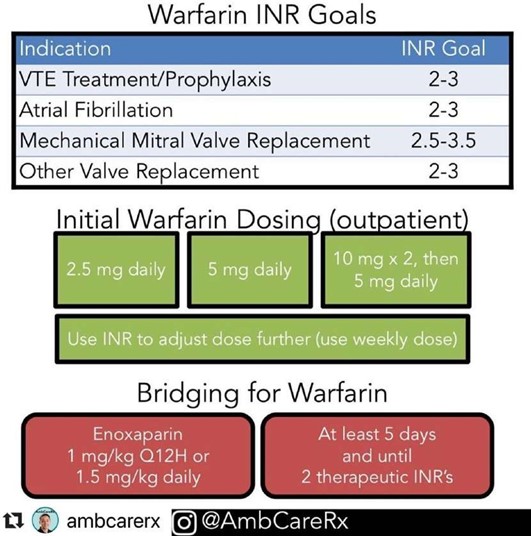A nurse is providing discharge teaching about warfarin to a client who has deep- vein thrombosis.
The nurse should instruct the client to obtain which of the following laboratory tests monthly?
Platelet count.
aPTT.
Fibrinogen.
INR.
The Correct Answer is D

A client who has deep-vein thrombosis and is taking warfarin should obtain an International Normalized Ratio (INR) test monthly.
This blood test measures how fast the blood clots and helps the healthcare provider determine if the client is taking the right dose of warfarin to keep them safe from bleeding and making clots.
Choice A is wrong because Platelet count, is not the correct answer because it measures the number of platelets in the blood and is not specifically related to warfarin therapy.
Choice B is wrong because aPTT, is not the correct answer because it measures the time it takes for blood to clot and is used to monitor heparin therapy, not warfarin therapy.
Choice C is wrong because Fibrinogen, is not the correct answer because it measures the amount of fibrinogen in the blood and is not specifically related to warfarin therapy.
Nursing Test Bank
Naxlex Comprehensive Predictor Exams
Related Questions
Correct Answer is D
Explanation
Long-term use of prednisone can lead to a decrease in bone density and an increased risk of osteoporosis.
Consuming a diet high in calcium can help to maintain bone health and reduce the risk of osteoporosis.
Choice A is wrong because while it is important for individuals taking prednisone to receive immunizations, they should not receive live vaccines due to the immunosuppressive effects of prednisone.
Choice B is wrong because prednisone can cause hypertension, not hypotension.
Choice C is wrong because prednisone can cause hyperglycemia, not hypoglycemia.
Correct Answer is A
Explanation
Sodium polystyrene sulfonate is a medication used to treat high levels of potassium in the blood.
A potassium level of 4.6 mEq/L is within the normal range, indicating that the medication has been effective in reducing high levels of potassium in the blood.
Choice B is wrong because Calcium 8 mg/dL, is not the correct answer because it measures the level of calcium in the blood and is not specifically related to sodium polystyrene sulfonate therapy.
Choice C is wrong because Magnesium.1 mEq/L, is not the correct answer because it measures the level of magnesium in the blood and is not specifically related to sodium polystyrene sulfonate therapy.
Choice D is wrong because Sodium 150 mEq/L, is not the correct answer because it measures the level of sodium in the blood and is not specifically related to sodium polystyrene sulfonate therapy.
Whether you are a student looking to ace your exams or a practicing nurse seeking to enhance your expertise , our nursing education contents will empower you with the confidence and competence to make a difference in the lives of patients and become a respected leader in the healthcare field.
Visit Naxlex, invest in your future and unlock endless possibilities with our unparalleled nursing education contents today
Report Wrong Answer on the Current Question
Do you disagree with the answer? If yes, what is your expected answer? Explain.
Kindly be descriptive with the issue you are facing.
